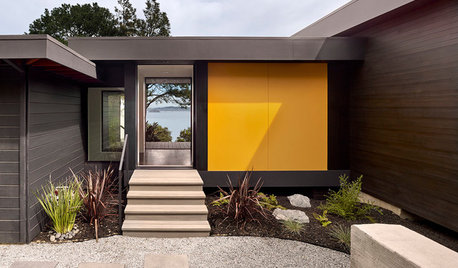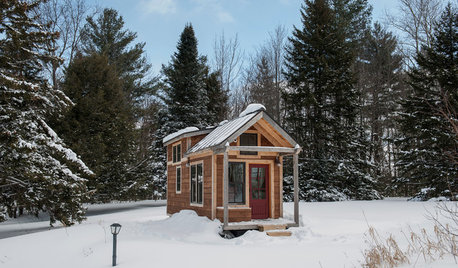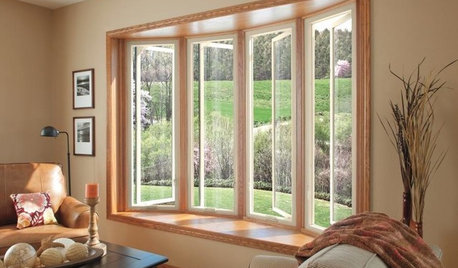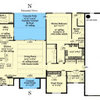Charged for Custom Home Bid
handyman923
8 years ago
Featured Answer
Sort by:Oldest
Comments (38)
cpartist
8 years agohandyman923
8 years agoRelated Discussions
Charging for bidding?
Comments (5)It's common for busy in demand guys to charge for putting together a bid for someone that doesn't come from a referral from a trusted source. It weeds out the wheat from the chaff. Given what you've posted here about using a non US architect, who can't possibly supply buildable stamped plans that will satisfy your local code office, or have any clues about local costs, AND having a tight budget, you've placed yourself firmly in the ''dreamer''category rather than as true potential project. If you want to build, you need to start with a LOCAL architect whom the local builders have worked with befor. Or just buy sometbing existing. That's always the best first choice for someone on a budget. Why should a builder put in 40-60 hours of work on a project that has no chance of being built, from someone who already says the project costs more than they are comfortable spending? Estimates are one thing, and you balked at what you were told for that. Bids are WORK, and no one works for free!...See Moreprice range of custom cabinet bids
Comments (3)That's not an easy question...there are so many variables involved. For example The part of the world/country (down to the county and, sometimes, the city/town) that you live in How the cabinets are constructed What the cabinetmaker actually builds (e.g., some build the entire cabinet while others just build the boxes and buy the doors & drawer fronts) Quality of the cabinets Quality of the hardware used (hinges, drawer glides, etc.) Finish and how the finish is done: Painted, stained, glazed What the cabinetmaker considers standard vs an upgrade (some will include soft-close drawers as standard, for example, while others would charge more for them) What upgrades (and downgrades) a person went with (as part of their price) These are just a few examples of the many factors. Your best option is to research custom cabinetmakers locally. Get several quotes of the exact same things and see what you get. Do the same with semi-custom and custom cabinets from local stores (both "big box" and cabinet showplaces/stores). Then, see the finished products personally, preferably installed and in-use for a few years. There are other things to look for in a "local custom cabinetmaker", but this is a good starting point. See the thread linked below for more tips/pointers. Good luck! Here is a link that might be useful: Thread: Disadvantages to local custom cabinets?...See MorePaid for Custom Home Design and now Bids are Way Over Budget
Comments (74)Pensacola, good plans, but what do you do if, say, the tile you want to use is discontinued? And perhaps (?) obviously no one is going to store ALL of it before you get close to that far? I'm mentioning this because I had no less than 4 tiles I'd chosen discontinued, but I was able to find spare bits of one of those enough to make me happy. (I kept my replacements that I picked later within the same price range.) I also lost out on my first choice for one of my quartz countertops... (ain't no one storing that!) but actually found something much better once push came to shove, and the old one was gone! I also don't know exactly what light fixtures I want until I see the place in situ. Some yes, some no. Where I could be definitive before the structure was built, I certainly was....See MoreRetainer fee for custom home bid?
Comments (31)Mike, There's a number of issues with your post. 1)Contractor/builder charges you nothing and spends 30 minutes reviewing your construction drawings, and comes up with a best guess as to what the build might cost. I'm not submitting detailed specs and plans to a contractor for a "best guess." I'm looking for a detailed bid between various contractors to find out who will give me the best value for my money. Anyone who would work off a "best guess" pretty much deserves what they get. 2) Subs end up charging more for the work than the contractor expects, and 2/3rds of the way thru you've spent $500K and you are not done yet. You're over budget, and the bank won't give you more money to finish your house. Once we sign a contract for the fixed price, if the subs come back and tell him/her they are charging more, that's not my problem. That's the risk for a contractor signing a fixed price contract. And if the first contractor can come back and says he/she needs more money, how is $10,000 upfront going to stop the second one from doing exactly that? If you refuse to pay, and he/she walks off the job, you now have three problems--no contractor and no $10,000, plus you have to get your lawyer involved to try and recoup whatever you can. 3)You pay your contractor $10K up front, he knows your serious about this project. He spends 20+ hours on the bid, sends the construction documents to his subs, they give him accurate estimates, and he knows exactly what the build cost is. He talks with and clarifies things with the architect. Cost is $525K. You know right away that you are over budget, but because construction has not started, you can easily change some things in the build to bring you back under budget. You make a few changes, bring the build cost down to $475K, and the project completes on time and you don't run out of funds from the bank. What exactly do yo mean by :"serious about this project"? If I'm seeking bids, I'm serious. If I've had to spend $10,000 to get John Doe Construction even to talk to me, does that mean six months down the road he guarantees that he won't stop work for four weeks for whatever reason he gives? What proof do I have that he's serious about my job? The burden of proof on seriousness does not lie with me. As to the 20+ hours he or she has spent on preparing the bid, that is the cost of doing business. Other contractors seem to get that. I would like to know how many people on Houzz actually paid a retainer fee upfront before getting a bid. I can't imagine that number would be very high. The compensation that someone gets is dependent upon the amount of value they offer. Value only comes from something that someone is either unwilling or unable to do for themselves. If I raised cattle, hogs and chickens and grew crops I could feed myself. The value of a grocery store would be nonexistent. But I don't, so the grocery store has value. But, if Kroger requires me to pay $3 to look at their online circular but IGA doesn't, guess who will get my business, even if IGA charges a higher shelf price? Just because Kroger doesn't want to spend money upfront to create a circular doesn't mean I have to accept their requirements to pay. I, like the majority of consumers, will move on to someone else. I can't build a house, so I will pay a GC a fair price for his or her talent. But before I choose that they have to provide me with a detailed bid. If they insist on charging for that process, I will kindly say thanks, but no thanks and move on. And this notion that contractors who charge for bids upfront are somehow a bulwark against crooked contractors seems silly and self-justifying. If a contractor wants to charge, that is his or her right, as it is my right as the boss to say not if you want my business. My guess is they don't, and that's fine. There's someone else just as good who does....See Morecollfoster
8 years agoMini Soda
8 years agopwanna1
8 years agoUser
8 years agoamberm145
8 years agomusicgale
8 years agocollfoster
8 years agoGIRSH DEVELOPMENT INC
8 years agocpartist
8 years agoUser
8 years agolast modified: 8 years agoGIRSH DEVELOPMENT INC
8 years agoGIRSH DEVELOPMENT INC
8 years agobry911
8 years agocpartist
8 years agolast modified: 8 years agoUser
8 years agoGIRSH DEVELOPMENT INC
8 years agobry911
8 years agobry911
8 years agolast modified: 8 years agoUser
8 years agoOaktown
8 years agolast modified: 8 years agobry911
8 years agoOaktown
8 years agolast modified: 8 years agobry911
8 years agolast modified: 8 years agoGIRSH DEVELOPMENT INC
8 years agoR J Hoppe Inc
8 years agoOaktown
8 years agobry911
8 years agoGIRSH DEVELOPMENT INC
8 years agobry911
8 years agoGIRSH DEVELOPMENT INC
8 years agoomelet
8 years agoR J Hoppe Inc
8 years agoJordyn Spann
8 years agoGIRSH DEVELOPMENT INC
8 years agoCASEY BUILDING SOLUTIONS
8 years ago
Related Stories

HOME TECHReady to Bid Good Riddance to Charging Cords?
A new breed of base stations will reduce wires, decluttering homes and saving sanity everywhere
Full Story
BUDGETING YOUR PROJECTConstruction Contracts: What to Know About Estimates vs. Bids
Understanding how contractors bill for services can help you keep costs down and your project on track
Full Story
MOVINGTips for Winning a Bidding War in a Hot Home Market
Cash isn’t always king in a bidding war. Get the home you want without blowing your budget, using these Realtor-tested strategies
Full Story
THE HARDWORKING HOMEA Hidden Charging Cabinet Corrals and Juices Family’s Electronics
The Hardworking Home: Laptops, phones and tablets now have a safe space in this kitchen, keeping the countertops uncluttered
Full Story
DIY PROJECTSHide All Those Wires in a DIY Charging Station
Keep your gadgets handy and charged with a flexible storage board you can design yourself
Full Story
ORGANIZINGCharging Stations Lead Tidiness Battle
Keep your cell phone, camera and other electronics handy and juiced up without a tangled mess of cords
Full Story
DECORATING GUIDESWhere to Embrace Custom Furnishings in Your Home
Upholstery, draperies, rugs and mirrors are a few of the items for which it makes sense to consider a custom option
Full Story
ORGANIZINGCustomize Your Home Command Center
The right tools in the drop zone make it easier to keep track of busy lives. Here are 13 features to consider
Full Story
TINY HOUSESHouzz Tour: A Custom-Made Tiny House for Skiing and Hiking
Ethan Waldman quit his job, left his large house and spent $42,000 to build a 200-square-foot home that costs him $100 a month to live in
Full Story
GREAT HOME PROJECTSUpgrade Your Windows for Beauty, Comfort and Big Energy Savings
Bid drafts or stuffiness farewell and say hello to lower utility bills with new, energy-efficient windows
Full Story






User